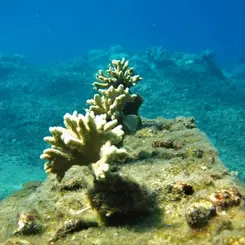
Environment and Biodiversity
Place
Tumbak, Nord Sulawesi, Indonesia
Sponsor
Céline Muron
Grant(s)
€5,000 to the Selection Committee at 2012/03/06
Project leader
"As an active volunteer in the nonprofit, I had the opportunity to take a field trip in April 2011, including in the village of Tumbak (North Sulawesi). I was impressed by the commitment of the volunteers and the villagers. Over and above the technical aspects, which are rather simple to implement, the remediation project for the coral reefs is really well structured!"
Céline Muron
In the village of Tumbak, the exploitation of marine resources is severely damaging the coral ecosystems. This is because of the intensity of the exploitation of this heritage habitat - 60% of the fish caught by the fishermen in Tumbak Bay are species native to the coral bay - destructive fishing practices (cyanide, dynamite) and the lack of management, have caused the disappearance of 40% of the reefs of the bay (about 80 hectares). The project led by Acroporis and the villagers is aimed to remediate the bay to help boost halieutic productivity. Its main challenges concern restoring the ecological functions of production, protection and feeding grounds of the coral ecosystem, with the objective of maintaining local fisheries and preserving the specific, genetic and structural biodiversity of the reefs and the associated species.
Immersion of 50 artificial reefs and 15 coral culture tables
Of the 1 600 inhabitants of Tumbak, 80% live from the sea. The reefs of the bay were mapped between 2007 and 2011. In 2010, priority remediation zones were identified in cooperation with the villagers and the local authorities (village mayor, Bureau of Fisheries and the Environment). And during the pilot project, also conducted in 2010, 3 artificial reef structures and 3 cuttings tables were positioned. After propagation, it would appear that the corals are well acclimatized and the transplants display low mortality on the three sites (less than 10%). The results are positive and encouraging, and Acroporis is therefore launching the full-scale project, with a 2012 target of immersing 50 artificial reefs and 15 coral culture tables, to restore part of the destroyed coral habitat. This is merely the first step in the more comprehensive approach to participate in management of the natural resources of Tumbak Bay, particularly via the establishment of a protected community marine area.
OTHER PROJECT SUPPORTED
Acroporis: Producing educational tools for the conservation of the coral reefs aimed at more than 300 Indonesian students
Domain: Environment and Biodiversity
Country: Indonesia
Endowment: 2011/04/05
Learn more about this project

